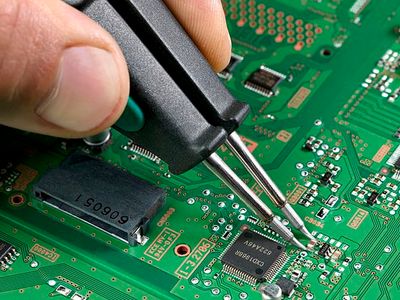- Leaders that function as transmission lines
- System design and component modelling
- System noise and noise budgets
- Signal integrity in high speed electronic systems
- Power supply Noise, delivery, distribution and protection
- Basic RF design and impedance matching
- High speed PCB level design and higher levels design
- Basic EMC/EMI and shielding
- Performance modeling and conceptual design of electronic systems
IL2237 Electronic Systems Design 7.5 credits

Unlock the critical skills needed to design and optimize high-speed, complex electronic systems with our comprehensive course in Electronic System Design. In today's technology-driven world, the performance of electronic systems hinges on the precision and integrity of every design element—from printed circuit boards (PCBs) to system-level architectures. This course is designed for aspiring engineers and professionals who want to master the principles and techniques behind high-performance electronics design.
Information per course offering
Choose semester and course offering to see current information and more about the course, such as course syllabus, study period, and application information.
Course syllabus as PDF
Please note: all information from the Course syllabus is available on this page in an accessible format.
Course syllabus IL2237 (Spring 2024–)Content and learning outcomes
Course contents
Intended learning outcomes
After passing the course, the student should be able to:
- explain and apply basic principles and guidelines for physical architectural design for complex electronic systems from the level printed circuit boards (PCB) to higher levels
- design PCBs considering signal integrity and impedance matching
- analyse and budget system noise
- design power distribution and analyse noise related to power supply
- design impedance matching networks for electronic systems for radio frequency
- analyse the influence of interconnects at different levels on the performance of electronic systems
- analyse EMC/EMI-disturbance in electronic systems
- model the performance of electronic system
- explain how the production of electronics influences the global heating and consumption of natural resources, and how life-cycle analysis and the global aims can be used
in order to obtain coherent knowledge and practical tips about physical (i.e. hardware) architectural design (on PCB and higher levels) of complex electronic systems.
Literature and preparations
Specific prerequisites
Knowledge of digital electronics, 6 higher education credits, equivalent completed IE1204/IE1205.
Knowledge of circuit theory and analogue electronics, 7.5 higher education credits, equivalent completed course IE1202.
Course from Upper Secondary School equivalent to the Swedish upper secondary course English B/6.
Literature
Examination and completion
Grading scale
Examination
- TEN1 - Examination, 4.5 credits, grading scale: A, B, C, D, E, FX, F
- LAB1 - Laboratory, 3.0 credits, grading scale: P, F
Based on recommendation from KTH’s coordinator for disabilities, the examiner will decide how to adapt an examination for students with documented disability.
The examiner may apply another examination format when re-examining individual students.
If the course is discontinued, students may request to be examined during the following two academic years.
TEN1 is an oral examination.
Examiner
Ethical approach
- All members of a group are responsible for the group's work.
- In any assessment, every student shall honestly disclose any help received and sources used.
- In an oral assessment, every student shall be able to present and answer questions about the entire assignment and solution.
Further information
Course room in Canvas
Offered by
Main field of study
Education cycle
Supplementary information
In this course, the EECS code of honor applies, see: http://www.kth.se/en/eecs/utbildning/hederskodex.